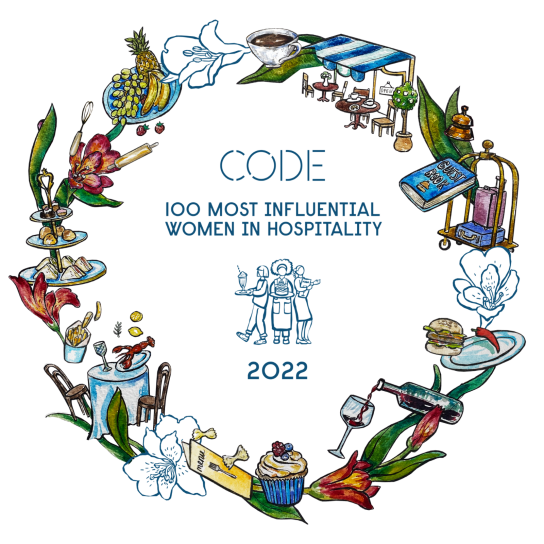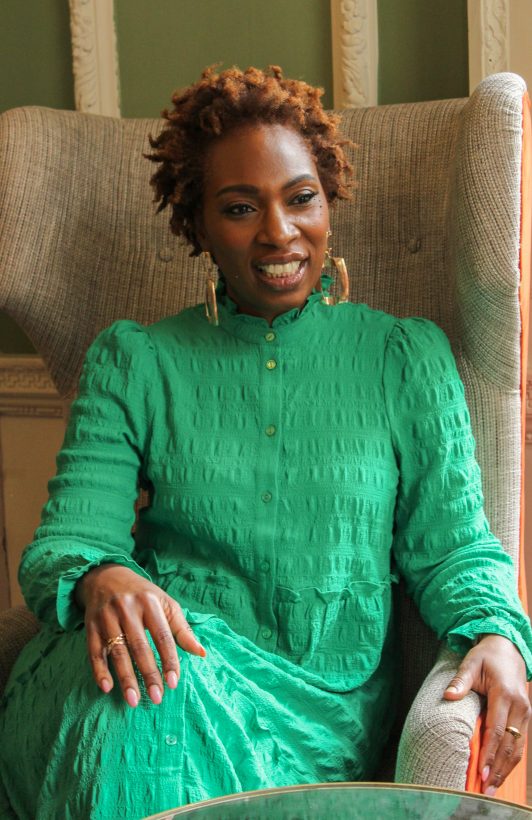
Entrepreneur Award
sponsored by
Winner: Lorraine Copes

After two decades in high-powered hospitality roles, Copes founded Be Inclusive Hospitality CIC, a social enterprise built to address the lack of diversity she saw in positions of influence within the industry. Through it, Copes has mentored people of colour, coached businesses and ignited conversations about how to make hospitality more inclusive and reflective of society as a whole. This year, Copes was named Food & Drink Innovator of the year by GQ, and as her influence grows, so does the supportive, interconnected community of people of colour that she’s helping to build.
How are you? How the past few months been for Be Inclusive Hospitality, and for you?
It’s been mayhem, actually. We’ve started the year at a point where all businesses can plan forward for the first time in two years. We’ve been super busy working on loads of projects recently – not just the scholarship programme, which is keeping us really busy; we also have a mentorship scheme live. We signed up some partners, grew the team to three in February. So yes, it’s been great.
Can you talk a bit about your journey to starting Be Inclusive, and what drove you to do it?
I have worked in the industry for the past 20 years, for a number of brands, and in the past 10-12 years, I was a senior leader on the executive leadership team for businesses like Shake Shack, Ramsay Group, and Corbin & King. And as my career progressed, I got to a point where I recognised there’s a purpose bigger than me.
Throughout my career within the industry – and it remains the case today – there was a real, stark lack of representation in positions of influence. And it’s never been acknowledged as a problem. Actually, hospitality celebrates its diversity. But if you’re Black or Asian, you’re generally not in a senior position. You’re not really visible within the sector apart from the odd one or two. That’s symptomatic of the society that we live in. And it needs to be addressed.
So, in 2020, we had a lot of time on our hands. I had already had the idea, but that time gave me the opportunity to really get clear about the mission and how we’re going to deliver it and build the community. Then, we launched officially on the first of June of 2020. It’s been a kind of fast-paced journey from that point.
But the ‘why’ is simply that race inequality is a problem in the industry – in hospitality, food and drink. And it needs to be addressed.
When it comes to diversity and equality – in any industry – it can be easy for companies and leaders to make big claims and say the right words without backing them up with actions or any real systemic change. How can we tackle this, and what do you think we can do to make sure things actually change in a meaningful way?
I think that performative businesses and people will always exist. I think that we all individually have a responsibility – whether you’re a leader, or whether you’re an individual within the industry, or an individual within society – we all have a responsibility. And in terms of tackling this, my pure focus is on businesses that care and that want to be better, do better and drive change. That’s where we choose to place our focus.
Businesses being performative has always been the case, right? And the reason why they exist is because being performative doesn’t really drive change. It doesn’t drive change at all, actually – it’s optic.
Can we address that? Probably not. But what we want to continue to do is grow our community of individuals and businesses who care about changing, want to drive change, and will put their money and their resources and time where their mouth is. That’s our focus.
How do you measure the outcome of what you’re doing? What are some pointers of success?
We are a social enterprise, so our key measure for anything that we do is impact. We’re in the process of producing our first Impact Report, and just to give you some insight on the kinds of things that we measure, I’ll give you an example:
We ran a mentorship scheme last year. There were 23 people on that scheme. Forty per cent of those 23 have gone on to secure new jobs or promotions since being on the scheme. That, for us, is quantifiable impact. Similarly, we’ve delivered workshops for just shy of 600 leaders within the industry, talking about race and inclusive leadership, and five out of five would refer the course. We’ve had loads of really great feedback in terms of the impact it’s had on their individual employees, as well as how they now approach their diversity and inclusion strategy.
So, we quantify everything we do with the number of people that we touch, but also how those actions then impact people of colour within the industry broadly, because the thing with diversity and inclusion work is that doing the work doesn’t just benefit one demographic of your employees. It benefits everyone to be inclusive, and to be diverse, and to ensure that people are seen, and that there are initiatives in place to level the playing field.
I think that’s really important to note, because it’s one thing to acknowledge that we have a legacy of inequality in this country – and that’s across not only race, but across gender, across sexuality. But now that we recognise that there’s the inequality, it’s not enough to just acknowledge it and say, ‘OK, yes, we do have a problem’. How are you now going to level the playing field for those people that have previously been marginalised? That’s a really important conversation that the sector is yet to have broadly.
Do you have any advice that you’d give to yourself, as a woman at the start of your career, or when you were starting Be Inclusive a couple of years ago?
Advice? There are so many things.
I would say that understanding and recognising that change will not happen immediately is really important. This business was started during the lockdown, so we had time on our hands. I decided to spend time with who I could virtually, but it was a lot of work. What the lockdown allowed me to do is reflect and be more strategic and timely with what we do – doing more impactful things instead of smaller-impact things in a short space of time.
Another piece of advice is to just step out and be brave. Being seen is really important. I say that because at the beginning of this journey, I remember the business being in the press with pictures of me, and I was really uncomfortable, because I didn’t start the business so that I would be visible. It was more about the cause and why we’re doing this. And that made me a bit apprehensive about being out there, or posting, because this is not about Lorraine personally. It’s about a bigger cause.
But it’s necessary to be visible. As an entrepreneur, your cause is visible, but who you are is important too, and that needs to be visible along with the business. I think that’s something that took some time for me to feel comfortable with – stepping forward and doing that.
Do you think that there’s anything that the hospitality industry could be doing to make it a more welcoming place for women to be, work and grow?
I look at gender equity in the same way as I look at any problem. For something to change, you’ve got to first address the barriers and the problems of the industry as to why it’s not attracting women. Obviously, there are women in the industry, but I think where there’s a lack of representation of women in positions of influence. There’s a cultural shift that needs to happen across the sector in order for that to change.
I’ve seen the same with race. People talk about how to attract diverse talent, how to recruit them, but actually, hospitality is an industry doesn’t have a diversity issue. It doesn’t have a race diversity issue. Seventeen per cent of the sector identify as Black, Asian or an ethnic minority. And it doesn’t have a gender issue – I’m pretty sure it’s parity with the population: 50/50 or thereabouts in terms of the gender split.
But where those women are holding roles is the issue. So, it’s really about inclusion and equity, pulling the mirror on ourselves as an industry and saying, ‘What is not great about this industry? Let’s address it’.
There’s a lot said about hospitality being an industry where you come in without any skills, learn them, and can rise to the very top. Do you think it’s much more difficult for women to do that?
I think that there are some challenges. I think we’re seeing a shift, but I’m seeing a shift if you’re a white woman. And the problem is that it needs to be intersectional. There definitely are still barriers across the board from a gender perspective, but where you are seeing women of influence, they’re largely white. And that’s not gender equity for me.
But it’s getting better. And there are some phenomenal female chefs that are now running their own restaurants, and their food is amazing. They do phenomenal things. There is definitely a shift taking place. And I can tell you for the past 10 years on the boards that I’ve sat on, it’s been a gender split of 50/50. I know quite a lot of female CEOs; I don’t know any Black female CEOs. Until I see that, I still believe we have a big problem.
A message from the award sponsor

FLM is proud to sponsor the entrepreneur award as part of CODE’s Most Influential Women in Hospitality 2022. As a business we are passionate about championing female talent, be that of the amazing women working at FLM or our awe-inspiring female clients.
In an industry historically overpowered by men (both adviser and client), we’re on a mission to level the playing field. To this day, meeting with a financial adviser can feel like an intimidating process for a lot of women, but it’s amazing to see such a dramatic increase in the number of women feeling confident enough to take financial advice, giving them complete clarity and control over their finances.
We work with such a wide range of successful women across so many industries, from hospitality, to entertainment, to investment banking. Helping them put bespoke, robust, long-term financial plans in place for their futures is a hugely satisfying part of the job and gives those women total peace of mind.
So, after a very tough couple of years for the hospitality industry, we’re thrilled to be championing entrepreneurship in hospitality with this award. All great businesses start with an entrepreneur; someone others can call ‘crazy’, a ‘risk taker’, a ‘free spirit.’ Who wouldn’t want one of these titles?
To all nominees and to all female hospitality entrepreneurs across the UK, we salute you and we wish you every success.
Read this year’s full list of our 100 Most Influential Women in Hospitality here
